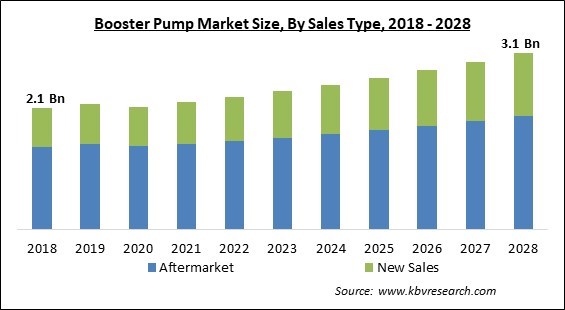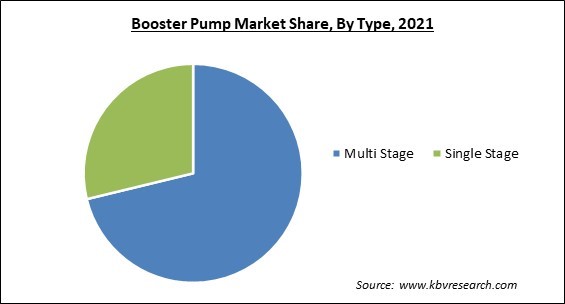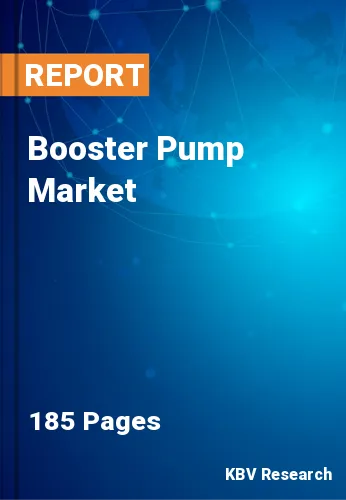The Global Booster Pump Market size is expected to reach $3.1 billion by 2028, rising at a market growth of 4.9% CAGR during the forecast period.
A booster pump helps to increase the pressure and volume of water which flows from different sources. Low-pressure water makes simple routine of life, such as bathing, brushing, etc. more hectic, but a booster pump can make these tasks easy and fast. A booster pump boosts the water's pressure and enhances the flow rate. The booster pump has blades that spin to increase air movement. In addition, it has an impeller inside, which maximizes the flow of water and pressure for the target location.

Booster pumps are available in the market as single-stage pumps and multi-stage pumps with on-and-off features. The control unit of the booster pump manages the pressure of water flow and keeps it constant for the whole process. When a low pressure of water is encountered, the pressure sensor sends signals to the control unit to escalate the pressure of the water and manage the flow of water. Booster pumps are categorized into single-stage and multi-stage pumps.
Single-stage booster pumps are commonly used in homes or other residential or commercial buildings that are at a distance from the regional municipal water supply. Additionally, single-stage pumps are used in places where the pressure of water is low. Whereas, multi-stage booster pumps are used to escalate water supply in mountain & hilly locations for several reasons, for example, agriculture, commercial, and residential purposes. Also, multi-stages booster pumps are often installed in tall buildings to increase the reach of the water supply at the top of the building.
The widespread COVID-19 pandemic was a barrier to investment in the vast majority of different businesses, with a few notable exceptions. The requirement for operational reliability has increased as a result of factors including fluctuating prices, restrictions on trade, and a lack of available labour. The principal reasons of operational requirements are shifts in the pattern of water consumption as well as emergency actions implemented by numerous countries to combat the pandemic. The pandemic caused by COVID-19 has had a negative impact on the market for booster pumps. This is primarily because there are limitations placed on the manufacturing and retailing of things.
The rising population of many developing countries surges the demand for residential buildings. The construction process requires a huge amount of water for consumption. Thus, the rise in water consumption through single water sources and poor water management provided by the municipal corporation is escalating the demand for booster pump installation. The continuous development in the residential construction sector and improvement in domestic water-packaged booster pumps are anticipated to develop the growth of the market.
The implementation of strict regulation by the government on energy utilization and upgrade of domestic water booster pumps is proven to be energy saving. This is predicted to surge the demand for energy efficient pumps. The pumps with the capability of controlling and managing the flow or pressure of the water are recognized as intelligent pumps. The rapid urbanization and modernization of infrastructure are providing significant potential for the expansion and development of the booster pump market.
A booster pump functions on gas-powered engines which depends on fossil fuels and can potentially emit a considerable amount of carbon monoxide, hydrocarbon, nitrogen oxides, and small pollutants. These emissions from booster pumps are affecting the environment, and due to a few environmental concerns, many users are not opting for booster pumps. The environmental issues associated with the booster pumps may restrict the market growth during the projection period.
On the basis of type, the booster pump market is segmented into single-stage and multi-stage. In 2021, the multi-stage segment registered the maximum revenue share in the booster pump market. Multi-stage booster pumps are used to pump the water and raise the pressure of water in hilly locations, specifically for usage in agricultural and commercial purposes. The demand in this segment is increasing due to as these type of pumps are very effective because they have a number of smaller impellers that can fit into smaller spaces.

By sales type, the booster pump market is divided into new sales and aftermarket. In 2021, the new sales segment recorded a remarkable revenue share in the booster pump market. The booster pumps of original manufacturers are more effective and reliable in terms of the working than the aftermarket products.
Based on application, the booster pump market is classified into household, agriculture, water& wastewater, and industrial. In 2021, the residential segment covered a substantial revenue share in the booster pump market. The supply of water in high-rise buildings may need a booster pump at several levels to provide enough water pressure on all the floors. The continuous issue of low pressure in high-rise buildings by the residents is developing the demand for the installation of booster pumps and proliferating the growth of the market.
| Report Attribute | Details |
|---|---|
| Market size value in 2021 | USD 2.2 Billion |
| Market size forecast in 2028 | USD 3.1 Billion |
| Base Year | 2021 |
| Historical Period | 2018 to 2020 |
| Forecast Period | 2022 to 2028 |
| Revenue Growth Rate | CAGR of 4.9% from 2022 to 2028 |
| Number of Pages | 185 |
| Number of Tables | 349 |
| Report coverage | Market Trends, Revenue Estimation and Forecast, Segmentation Analysis, Regional and Country Breakdown, Companies Strategic Developments, Company Profiling |
| Segments covered | Sales Type, Type, Application, Region |
| Country scope | US, Canada, Mexico, Germany, UK, France, Russia, Spain, Italy, China, Japan, India, South Korea, Singapore, Malaysia, Brazil, Argentina, UAE, Saudi Arabia, South Africa, Nigeria |
| Growth Drivers |
|
| Restraints |
|
Region wise, the booster pump market is analyzed across North America, Europe, Asia Pacific, and LAMEA. In 2021, the North America region held the highest revenue share in the booster pump market. The surging investments by dealers and manufacturers for building new projects, the presence of the big business player, developing demand for the effective booster pump, and quick urbanization & industrialization in the major countries of this region are anticipated to propel the development of the booster pump market in North America region.
Free Valuable Insights: Global Booster Pump Market size to reach USD 3.1 Billion by 2028
The market research report covers the analysis of key stake holders of the market. Key companies profiled in the report include Xylem, Inc., Pentair PLC, Franklin Electric Co., Inc., Witte Pumps & Technology GmbH (Dover Corporation), Alfred Karcher SE & Co. KG, Aquatec International, Inc., Dab Pumps S.p.A., Smith & Loveless, Inc., and Eddy Pump Corporation.
By Type
By Sales Type
By Application
By Geography
The global Booster Pump Market size is expected to reach $3.1 billion by 2028.
Rising residential as well as commercial construction activities are driving the market in coming years, however, Adverse impact on the environment restraints the growth of the market.
Xylem, Inc., Pentair PLC, Franklin Electric Co., Inc., Witte Pumps & Technology GmbH (Dover Corporation), Alfred Karcher SE & Co. KG, Aquatec International, Inc., Dab Pumps S.p.A., Smith & Loveless, Inc., and Eddy Pump Corporation.
The expected CAGR of the Booster Pump Market is 4.9% from 2022 to 2028.
The Industrial market acquired the maximum revenue the Global Booster Pump Market by Application in 2021, achieving a market value of $1.1 billion by 2028.
The Asia Pacific market is leading the Global Booster Pump Market by Region in 2021, achieving a market value of $1.2 billion by 2028.
Our team of dedicated experts can provide you with attractive expansion opportunities for your business.

